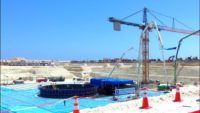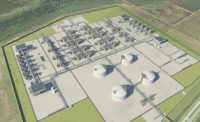Rosatom Nuclear Construction Portfolio Threatened by Sanctions Against Russia
More scrutiny from the European Parliament and tighter economic sanctions imposed against Russia for its role in Ukraine’s civil war could threaten the international construction portfolio of state-owned nuclear power firm Rosatom, which the company says will reach $100 billion in 2014.
Finnish political leaders have called to stop an $8.4-billion nuclear power project in northern Finland, in which Rosatom has a 34% ownership stake. As the project waits to receive final approval from Finland’s Parliament in September, Environment Minister Ville Niinisto said construction of the plant would be a “step backward” as the rest of the EU works to reduce its dependency on Russian energy. Further, Finland’s Green party member of the European Parliament (MEP) Heidi Hautala warned in a statement that any country that provides an opportunity for Russia to expand its nuclear power capacity — when showing aggression against neighbors —is making a mistake.
In July, Hungary MEP Benedek Javor asked the European Commission to investigate a $10-billion “Paks II” nuclear plant expansion deal brokered between Rosatom and a Hungarian utility company without a public procurement process—a violation of EU regulations. “It was only at the last moment, as a result of secret negotiations between the Hungarian and Russian parties, that the transaction was transformed into a nuclear power plant construction project to be implemented by international agreement between the two countries,” Javor told the EC.
Paks would be Rosatom’s first EU job, and Rosatom’s international business, continues to grow despite mounting economic and political pressure on Russia. In 2014, the firm completed projects in Iran, India and Russia. Another 11 reactors are under construction at home and abroad. In mid-August, Rosatom announced China had invited the firm to build new reactors at an inland site. It also announced a deal to build Jordan’s first nuclear reactor.
Deals with Iran and Kazakhstan further padded the company’s backlog, with much of the success achieved on Rosatom’s willingness to loan customers the money to build and commission new nuclear powerplants. “The packages Rosatom can put together the ones in Finland and Hungary are hard for commercial vendors to rival because Rosatom has such strong financial backing from the federal government,” says Edward Kee, analyst for National Economic Research Associates.
The volume of the company’s international portfolio has nearly doubled from the $50 billion it reported in 2012, Rosatom says.
Fennovoima, Finland’s third nuclear power company, said its proposed plant needs a “supplement” to its environmental permit because of a change in scope and that it did not expect the project to be compromised because of Rosatom’s involvement. “We had originally proposed to build a larger plant that was designed by Westinghouse, but decided on a smaller plant,” says Tina Tigerstedt, spokesperson for Fennovoima. “We chose Rosatom because of their proven track record with this design.”
“It is a business, not a political, decision, Fennovoima says. “We’ve taken the steps to be very transparent on this project and fully expect to be given the supplement to our project in September. We are in a good position.”
While Rosatom continues to win new contracts and start up reactors, it is not happy that some of its relationships with colleagues abroad have soured. In December, U.S. Dept. of Energy officials eagerly announced the most expansive cooperation between U.S. and Russian nuclear laboratories, but the program was quickly terminated in April as the Ukraine situation escalated. A similar cooperation agreement between Rosatom and the United Kingdom has been stalled. “No decisions have been made on how this work will be taken forward, which is under consideration in the light of recent developments in Ukraine,” said Jingree Anjali a spokesperson for England’s Dept. of Energy and Climate Change.
In response, Rosatom says politics should have no place in nuclear energy development. “Rosatom stresses that any attempts to impose unilateral restrictions in this area will affect the initiators of such moves first,” the company says.
Apart from official economic sanctions, the European Commission issued a directive for member states regarding nuclear fuel —a large percentage of which is supplied by Russia. The publication European Energy Security Strategy said EU member states should diversify their nuclear fuel supplies and reactor designs, and avoid dependence on Russian energy sources.
“This could affect Rosatom’s bids in the future, if EU countries refer to this [directive] when they award contracts,” Kee says. “But most of the concerns about EU dependence on Russian energy sources are related to natural gas. A nuclear power plant in your own country is less of a risk to supply disruptions.”
While sanctions could damage Russia’s credit rating and the ability of the Russian government to raise funds from international sources, Rosatom’s nuclear construction program is unlikely to be affected, “unless they get a lot more severe,” Kee says.





